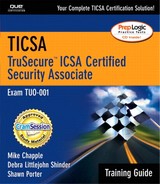Case Study: Acme Industries
SCENARIO
ESSENCE OF THE CASEHere are the essential elements in this case:
|
Acme Industries has retained you to help them develop an in-house security policy. Given a set of company networking, system, and communication requirements, you must first decide which of the many standard security policy documents apply to their situation, and will be required to meet their needs, which may be stated as follows:
Acme operates at only a single location, and has contracted with a local telecommunications provider to lease two T-1 connections to access the Internet.
Acme's sales force includes four traveling staff who require a secure analog dial-in to upload sales orders and download sensitive bid information to/from Acme's sales department's server.
Acme's employees are allowed Internet access only for professional use; no personal email or Web surfing is permitted during working hours, and certain Web sites are always off-limits.
Acme seeks to conduct more business online, and is contemplating a relationship with VeriSign to which it wants to outsource e-commerce, collections, and digital certificate services.
Acme has no third-party relationships that require it to open its internal networks to third parties.
Acme's product line rests on a trade secret formulation for a special bearing lubricant that is highly proprietary and confidential.
Given the following list of security policy documents, explain how each item in the list applies or does not apply to the foregoing list of Acme's requirements. If you must make assumptions to establish (or disprove) relevance of any given document, please state those assumptions as well as your explanation. If any document listed requires or implies inclusion of one or more additional documents, please mention those as well.
The list of potential security policy documents is as follows:
Acceptable Encryption Policy
Acceptable Use Policy
Analog/ISDN Line Policy
Antivirus Process
Application Service Provider Policy
Audit Policy
Dial-In Access Policy
Information Sensitivity Policy
Risk Assessment Policy
VPN Security Policy
ANALYSIS
Each of the items just listed is discussed in a parallel list next, according to the stated analytical and information requirements in the case study.
Acceptable Encryption Policy. Although encryption is not specifically mentioned in the Acme requirements as stated, the sales force needs for secure communications and the desire to conduct e-commerce and other secure transactions, as well as to contract for digital certificate services, all require encryption services for proper implementation. Thus, this policy will be an important part of Acme's security policy document collection.
Acceptable Use Policy. The third item in the list of Acme requirements clearly touches on an acceptable use policy. This type of document is a nearly universal component of a well-crafted security policy document collection in any case.
Analog/ISDN Line Policy. Because the sales force wants to dial in to exchange sales-related information with Acme's sales department server, a policy for use of analog lines is clearly required. What may not be as clear is that a requirement to access servers remotely also implies the need for Dial-in Access Policy, Remote Access Policy, and Server Security Policy documents as well.
Antivirus Process. Because Acme will be accessing the Internet, it must be prepared to prevent potential sources of infection or harm from viruses, Trojan horses, and other malefic code. Thus, this document is a key element of its security policy document collection.
Application Service Provider Policy. Because Acme intends to conduct business (and obtain services) from VeriSign, the company not only needs this document, but will also require a Third-Party Connection Agreement signed by both parties.
Audit Policy. Given the sensitive nature of Acme's proprietary data, and its desire to protect the confidentiality of its bid and sales data, Acme needs an audit policy to monitor access to such information.
Dial-In Access Policy. See comments for Analog/ISDN Line Policy, which also implies a requirement for this document in the Acme collection.
Information Sensitivity Policy. The foundation of any audit policy is data classification. The Information Sensitivity Policy document describes the classification scheme to be used, and how it is to be applied. Thus, it too is a required element in Acme's security policy document collection.
Risk Assessment Policy. Risk assessment is the cornerstone of any security policy. Thus, although the requirement for this document is not explicitly stated in any of the aforementioned Acme requirements, it underlies all of those requirements and enhances their further definition and elaboration.
VPN Security Policy. Although the requirements for dial-in access for the Acme sales force don't explicitly specify use of a virtual private network, this type of connection offers greater security than ordinary dial-up connections. Although it may be an assumption that Acme would be interested in using such technology to better secure its remote access, use of this technology (and an accompanying policy) should be discussed with Acme as they develop their security policy and the related document collection. If they opt to use VPN connections, this document should be included in the collection.
